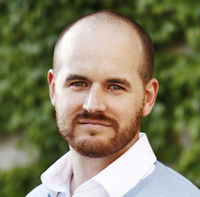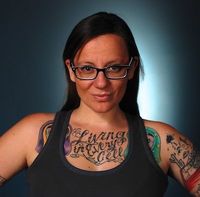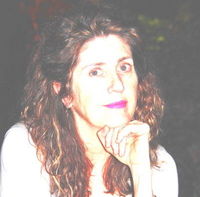"What's Your Story?" OBPO Contest Winners Part 4: Scarborough
We've had a season of amazing original writing on Open Book through the Ontario Book Publishers Organization's inaugural What's Your Story? writing competition. Today is our fourth and final instalment: four original texts from the winners in the Scarborough region.
For the contest, Toronto authors were asked to translate the character and diversity of their local neighbourhoods into writing, focusing on the "inner suburb" areas often under-represented in Toronto literature: Etobicoke, North York, East York, and Scarborough.
Authors submitted anonymous writing samples to demonstrate their literary talent, and once the four most compelling samples (three from the established author category and one from the emerging) were selected, those authors were asked to write an original piece that captures the essence of their region.
For the final chapter of the contest, we're hosting the original, commissioned pieces from winning authors writing about the Scarborough neighbourhood: in the Established category Liam Card, Cherie Dimaline and Elana Wolff, and in the Emerging category, a writer we're definitely going to watch, Leanne Simpson.
Check out all the winning authors' text in the Etobicoke, North York, and East York as well. All texts are hosted exclusively on Open Book!
Established Writer Category winners, Scarborough region
The Bottom of It by Liam Card
Zero six hundred hours is when had I reached the blind. Large branches had been sawed from my Catalpa tree out back a week prior and the large prehistoric-looking leaves were sure to cover me just dandy. A large pile of branches in front of an old man’s front porch. That’s all it is. But, not really. That’s the art of it, you see.
That’s what makes it so deadly.
Dressed head-to-toe in the best gear the local military surplus store had to offer, I expertly crawled out from the secret trap door under my front porch and into the blind. The large leaves of the Catalpa limbs brushed up against the non-toxic children’s paint that was smeared all over my face. The same stuff the great-grandkids left behind from last week when they were here to visit and to hug me as if I were a museum artifact. Something that might crumble to dust if they squeezed too hard. Like I said, it was zero six hundred hours right on the nose when I got comfortable in that blind. From my original military-issued pouch, I pulled out the ammunition and loaded my gun. This was the same military pouch I used in the farmer’s fields of France all those years ago when everyone and everything was blowing up around me. This pouch wasn’t like the rest of the military surplus crap I had on. It was original. The real deal. It had seen things, you know? We had been through some hard times together, me and that pouch. And, here we were, once again, reunited in battle.
Approaching zero six thirty now, and the Target will have left his house.
The last of the ammunition is loaded into the weapon.
Your CanLit News
Subscribe to Open Book’s newsletter to get local book events, literary content, writing tips, and more in your inbox
I should spend some time to tell you about the Target. This prick. This arrogant little bastard who had the nerve to buy my dear friend Calvin Franklin’s house (God rest his soul). The Target bulldozed the damn thing to the ground and erected this futuristic-looking behemoth that looked like a cross between a museum of modern art and an alien space craft – all glass and stainless steel. Black brick and odd angles. I spoke to the Target once. He’s a lawyer for one of the Bay Street firms. I forget which one, perhaps due to the fact that they are indistinguishable in my mind. A bunch of last names printed in succession on a business card. The target, he rattled off those last names as if they were royalty. As if I should be left gobsmacked and should repeat them again for good measure.
“What do you think of the new house?” he said.
“I knew the guy who built it,” I said. Truth is, I even helped him hammer together some of it, but I left that part out. What did he care anyway? That old bungalow was a ghost now. This new modern monstrosity of his, its tombstone.
It wasn’t always like this around here. The money, I mean. Or the scads people with it. All of them, drawn further and further away from the downtown core as neighborhoods became trendy and school districts became desirable. It was about ten years ago that they eventually spilled over the border of Victoria Park with their bags of money, and infected the best portion of Scarborough.
My portion.
Now, trendy.
Now, desirable.
Now, permanently under construction.
Zero six thirty, and I have a visual on the Target. Blue suit – two sizes two small. Pants – three inches too short, exposing pink and yellow polka-dot socks because, of course, men’s fashion was being murdered in tandem with the original houses of the neighborhood. The Target holds a dog lead, and whistles at his pooch to follow along. Out comes the pooch. Tongue curled out, breathing like it just ran a marathon. Of course, this is no ordinary pooch. This, I have come to find out, is a French bulldog who, by the wonder of science and surgery, is allowed to exist at all. Designer pooches. All of them, required to be born by caesarean section with three-thousands-dollar price tags or more. All of them, breathing like they’ve just run a marathon because, that’s just how they breath. The poor little mutant bastards.
The Target crosses the street because Margery Albrecht’s lawn is where the designer pooch prefers to take a dump. Margery is only a few years younger than I am. We grew up together back when this was a neighborhood and not something in vogue. She and Hank, a pal of mine, bought that house in 1937 after they got married. I can still remember her dancing around on that lawn with Hank when they first moved in. She was a real beauty, then. Hank, he a handsome, strapping fella who opted for the air force, and didn’t return. He’s still somewhere in the English Channel (God rest his soul), and Margery, she was never the same after that. I can still see them dancing with joy on that front lawn. Of course, time passes, and that front lawn is now the designer pooch’s shit zone.
The Target and the pooch approach Margery’s lawn and the moment of habitual indiscretion is close at hand. For me and my children, it was a wonderful experience to have a dog. In fact, we had several of them over many years. And the children, they learned about death the way most kids should - through the loss of pets, and not people. Being a dog owner, the only four things required of you to be a decent human being are the following: to be kind to it, to feed it, to water it, and to clean up after it. That’s it. The four commandments of dog ownership. Any violation of those four commandments, of course, results in your proper classification as a disgusting human being. Case closed. Nothing a lawyer from a firm with a string of last names can do about it. No re-trial. You’re just a scumbag.
Such is the case with the Target.
Every single day, at zero six thirty, the designer pooch sniffs around my dear friend Margery’s lawn, curls its back and coils one. From my blind, I watch this happen, as it happens every morning. Though, typically, I’ve been watching from my bedroom window with the binoculars. Margery had been complaining that a neighborhood dog had been messing up her lawn and I promised her that I would get to the bottom of it. So, here I am, at the bottom of it. All it took was a few weeks of surveillance in order to identify the hour in which the repeat offence was taking place, and the repeat offender, himself.
The designer pooch has successfully completed his morning movement, and the Target motions to his pocket for a baggie. Target, stop it. Please, stop it. You have no baggie in there. This is all a terrible mime, and you’re doing it all for me. I’m your only audience this morning and the acting, I must say, is atrocious. The Target looks around casually to make sure no one is watching, gives up on the mime act, and, just like that, whistles for the designer pooch to come along. A quick jerk on the lead, and off they go as if nothing had happened. However, this morning, something is going to happen.
The first shot hit him in the back of the neck, and, I must admit, that was unintended. I was hoping for something on the right shoulder but the sharp sting on the neck got his attention and spun him around for me to unleash hell. The second shot is a perfect strike, centre mass, which explodes his chest with red. Pop. Pop. Pop. Three more to the solar plexus, red, yellow, green, and the Target drops to the sidewalk, arms over his head and ears, screaming like a cat with its tail caught in the car door. I pop him two in the ribs, green, green, and that gets him scrambling to his feet and sprinting off, dragging the designer pooch behind him. All three-thousand dollars of the poor bastard. One more shot to the back of the calf. Just for the sake of my marksmanship. For my ego. For old times’ sake.
Yellow.
My life is now complete.
After my arrest, and eventual release on bail, it was the greatest thrill in the world to walk up to Margery’s front door and knock on it. One of life’s top moments to see her face light up, and to know that she was fully aware of what had transpired.
That I had, indeed, gotten to the bottom of it.
_________________________________________________
Birch Bones by Cherie Dimaline
The grass at Knox United Cemetery came up thin and crunchy like bristles on an elephant’s back, disallowing the leisure of a regular, corpse-free park. It was the groundskeeper’s opinion that the reason behind the curious consistency was all the bones.
“Roots are tiny wee funnels, ya see. They suck up what they can from where they can reach.” Leaning over the railing in front of Floyd’s shed, Winifred watched the flex and curl of her arms, imagining the mush of other people’s marrow bubbling amongst her platelets.
“Zombie grass, that’s what it is. Ya can’t trust it, neither.”
“Floyd’s a bit of a drinker,” Her father explained when Winifred told him about the undead greenery inching toward their door from as far as the border on Midland with its reassuring shuffle of residential cars and the pull and crank of the TTC. Six tiny words cobbled a fence around her sleep that night; six words were a lot from her father. Thomas was largely mute since his wife’s death.
Winifred's mother had been beautiful. Winifred's grandmother, Faith Trudeau, was Ojibway from the Georgian Bay, the land named after the white sands that rolled into the green of Lake Huron like the sugary cliffs of Dover. Her grandfather, was Zlatcho Kalder, the son of a Romanian gypsy whose family came to Canada in the last great migration of 1970. They were married in a small ceremony in the kitchen of a local priest’s house, paid for with a grandfather clock unhitched from the pick-up’s bed that morning. They raised their only daughter, Mary Bax Kalder- Winifred’s mother, in a house just off-reserve, crammed full of broken clocks, embroidered vests, cloudy gem-crusted cuffs and beaded moccasins. They took in a tidy profit during cottage season when the tourists parallel parked in the rocky driveway, half to buy antiques, half to see both a real-live gypsy and a real-live squaw together in the same house.
When Mary started to toddle about, the inventory became playthings and her parents were loath to take them away. The scratch of old lace soothed her swollen gums; the tinkle of bone shards broken off animal skulls banged against the metal bathtub made her giggle. So they began selling only the larger pieces of furniture.
The universe was kind for the next nineteen years and the little unit of three thrived, hidden away in their sloped cottage full of treasures and riches like pirates with admirable hygiene. Then, the summer after Mary met Thomas Blight and decided to follow him on his travels into the far-north, Faith and Zlatcho died in a fire that consumed their home and all its trinkets in one swift gulp.
Mary died giving birth leaving a sickly newborn who required all grieving to be re-designed into a kind of desperate hope her father was forced to provide for the both of them. The active parts of his mourning became her daily care. Bedtime stories were all about Mary, her faceted grey eyes in every princess, her sharp wit in each dragon. She was taught the same sayings Mary peppered her speech with, 'my stars', and 'tabernacle', and was dressed in frocks cut down to size from Mary's closet. The eventually came to Scarborough, a place her father said suited them since it was a quilt of custom, moving to a symphony of languages.
From her grandparents, Winifred inherited a compulsion to collect. In her attic room at the top of their apartment over the administration office, she kept a row of mason jars on a bookshelf with captured specimens and samples she couldn’t afford to lose. These were the talismans she turned in her grubby fingers, the smooth glass replacing maternal hands or hushed tones. Maternal absence she felt as the shadow of a felled birch with brittle grass creeping closer, and closer, until the day she was given entry to her mother’s world.
It was the beginning of summer vacation and Winifred was microwaving a wiener for breakfast when the doorbell rang.
‘DING’
She counted off four more seconds, yanked the sticky microwave door open and grabbed the pale hot dog, broken open from internal heat in some areas, still cool to the touch in others.
“I’ll get it,” she called to her obese Chihuahua who was collapsed sideways on the kitchen linoleum. “Don’t get up.” His whirring, ragged snore continued on uninterrupted, like a fat mosquito gearing up for take off and then chugging to a stop near the end of the runway.
She swallowed a mouthful of hot dog and smiled her best ‘ambassador for the office of the Chief Cremator’ smile, then opened the door.
“Good morning.”
The woman’s jaw fell and she rubbed her chin as if assessing a broken hinge. A pile of glittery bracelets tinkled on her arm like Christmas.
“Oh my, you look just like your mother.”
Suddenly Winifred was ashamed of her bare feet and rumpled t-shirt. She put the hand clutching the half-eaten wiener behind her back. Even if this woman had mistaken her for someone else, even if she turned out to be one of the homeless schizophrenics who sometimes wandered into Knox looking for something they’d lost long ago, even if this was all wrong, she felt she must be perfect in this moment, so that even if just for pretend, she really could look just like her mother. Winifred felt a kernel of hope skidding across the bowl of her tummy, ready to pop.
“You have to be Winifred.”
She nodded.
The woman laughed like a hiccup. “And I have to be Penny.”
“Penny.” Winifred said it out loud, lifting the tail of the ‘y’ so that it was a question. Must she be Penny?
“I’m your mother’s cousin. Well, second cousin, really, through our grandmas. But we used to play in the ditch together back home so I’d say we were as close as firsts.” Another hiccup of laugh. Winifred didn’t hear this one, because at that moment the kernel in her tummy popped, jumped up her throat, pinged off her uvula and she threw up a mouthful of microwaved hot dog. It fell wet and warm on her toes like pink rubber confetti to celebrate this small reunion.
“Oh shit, I guess that is a lot to lay on a kid.”
Penny crossed the threshold, put a hand on each of the girl’s shoulders, and marched her up the stairs, regurgitated meat balanced on her stiff foot.
“Well, lets get you cleaned up and start again, shall we?”
She guided the pale girl to the table and sat her in a chair before fumbling in the cabinet under the sink. She found a slightly crusty dust rag, made it damp with cold water from the tap and cleaned up her foot.
Penny smiled at the snoring mass of Chihuahua in the hallway. “I’m surprised your dog didn’t try to eat this mess while I was looking for a cloth."
“He wouldn’t wake up for a steak tied to a cat.”
“He sounds like an athlete.” Penny scooped up the pile and chucked it along with the rag into the garbage bin.
The dog let out a little ‘poot’ of gas and sighed, settling even deeper into his nap.
Winifred felt electricity in her limbs. Her mother’s family, here of all places. She imagined them as mystical people, carved from birch and planted in the Bay; she had imagined them magic. The kind of people who never waited 45 minutes for the Midland bus in the wet snow. The kind of people who didn’t bike up to Finch for $2 tacos from the strip mall. This space was too open around the concrete and brick to house them. And this cemetery was too regular.
Once she’d passed by Knox in a yellow school bus on the way downtown to the ROM museum.
“That’s where I live,” she said to Tiowa, pointing her finger against the glass.
“Bite your finger, quick!” Tiowa put her own index finger between her front teeth and clamped down hard enough to bring tears to her eyes.
“Why?”
She pulled out her finger, wiping it on the front of her t-shirt. “In Guyana, we never point at graveyards. Less you want them to rise and go after you. Now bite!”
Winifred stuck her finger between her molars and chewed thoughtfully. She’d just wanted to show her best friend where she lived. Maybe graveyards in Guyana were more vengeful than Scarborough. This place seemed devoid of magic.
But now, here was family in her kitchen, staring at her lazy dog. She was seized with a feeling that pinched her ribs seeking release. She pushed back in the chair and the legs on linoleum gave out an urgent squeal.
“Excuse me, I have to pee. Be back!”
Turning from the table, Winifred held out her hand, imploring the woman to stay with a slightly panicked smile. She took the stairs two at a time and burst into her room, headed straight for the bookshelf.
She found an empty jar between one half-full of cicada shells and the straw tornado of a bird’s nest. She took it down, unscrewed the top, and put the cool glass to her mouth, exhaling until her breath was laced with a low rasp along the bottom. When it was full of shaking expectation, and full of the silent witness of Knox’s bones, and probably smelling of hotdog, she screwed the cap on the jar and slid it back on the shelf. Satisfied with this quiet collecting, she went back down the stairs, a little slower now, with vines of dense hope knotted in the curves of her birch bark ribs.
_________________________________________________
The Golden Mile, The Bluffs by Elana Wolff
I first heard told of The Golden Mile at six—we were new to the city—
and lived for a while in a low-rise rental near Zion-Wexford Church.
I loved the sound of Zion and remember the church for the graves.
Once we went, my sister and I, to walk amongst the headstones.
The dead, my sister quipped, are alive! Look, they’re pushing worms
from the earth! My sister had a ghoulish sense of humour. (She still does.)
The graveyard grass was pristine green, but I could swear I felt those
worms against the soles of my shoes. That was the whirl of my child-
mind. And when our mother said, one day, We’re going to The Golden
Mile, I conjured something Disney-like magnificent. The Queen, our mom
declaimed, had come to The Golden Mile from London > Buckingham
Palace to Scarborough West. This, I later learned, was true. Though
at the time I thought my mom was bluffing. For what would the Queen
of England want with a strip mall of retail shops. And nothing there,
it turned out, actually golden. I was much more charmed by The Bluffs.
Our father called them Cathedral Bluffs the day he brought us there
to gaze at the Lake. My sister and I, wide-eyed and quiet, stood beside
our dad in the face of the wind. The wind grew sharp and buckled
as we breathed it from the top of the cliffs; they as pale as a stand of
Queen Anne’s lace. Magnificent, for real. Our dad was doing well that day.
We watched him doing well and we were happy. But in the watercolour
Bluffs he painted after that, he made the great pale cliffs appear grey-black.
_________________________________________________
Emerging Writer Category winner, Scarborugh region
Shiny Eyes by Leanne Simpson
String through flesh, the stitches came out like pulled teeth, stung just enough to make me cry but didn’t stop me from making wishes on them. “That’s not how this works,” Mom said, but I clutched my empty strings all the way home from the hospital.
I know what they say about my town – that it’s polluted under the veins, that we grew up tough. My first soccer tournament, we travelled to Mississauga in mismatched socks and lost every game, the other team of little girls shrieking that we were gonna cut them when I wasn’t even allowed to wash the steak knives at home. It’s easier to digest the ugliness of the world when sandwiched between intersections. I grew up the same speed as everyone else, too fast to see the passing trees but slow enough to climb them, blindly scraping limbs on limbs without worrying about scars.
Maggie had them all along her arms, skin paper machéd together with the artless beauty of a small child. I was nearly 18 the next time I went to the hospital at the top of the hill, after I forgot how to breathe in the middle of Scarborough Town. It wasn’t the first time either – just the first time anyone saw me the way I saw myself. Maggie took me to the window we now shared and pointed at the Wendy’s drive-through across the street. They don’t know how good they have it¸ she said. My city had never smiled so wide.
When asked where I came from, I proudly scribbled Scarborough on my scholarship applications, employment records and Indigo membership at STC (until they replaced it with a store that promised infinite youth and cheap spandex). I devoured their books with the same kind of hunger I had when I was 10 and determined to visit every library in my district: Port Union, Malvern, Morningside and westward, the words seeping in through my skin like I forgot to wear sunscreen.
I thought you didn’t need it if you grew up too close to the light. I thought my biggest threats came from outside of myself, things that I could almost control. In health class on Lawrence Avenue East, we learned about STDs instead of SSRIs, drugs, but not the drugs that would save my life two years later. They didn’t say that 1 in 5 of us would get so sick that we would be scared to open our eyes at night, but they told us that the mitochondria were the powerhouse of the cell, and we believed it.
Maggie was the only one in therapy who smiled when I said I wanted to be a teacher. Start small, they said, but I thought I was. I thought the best thing I could do with the worst parts of myself was lay them in the sun. But other people wanted to forget, wanted to gentrify our stories just like our houses, until we couldn’t find our way back home even if we wanted to. I called my immigrant grandmother from the hospital payphone and told her I knew what I wanted to do with the rest of my life. I’m so happy for you, she said, But where are you calling from? I hung up, starry-eyed.
My grandma had been in the internment camps long enough to form a deep mistrust of the government. She kept her money in muffin tins under the sink and lived in the heart of Kennedy Road, got her hair cut in the same basement salon for 35 years. She knew tough – lived it, too – and I didn’t know how to explain why I couldn’t get out of bed for days on end without taking away from her definition of the word. Depression didn’t seem to stand up against words like racism and segregation, couldn’t hold a candle to the horse stables she once slept in. All she wanted me to do was go to university.
I wasn’t the first from my school to get sick, but I fell the loudest. In the centre of the mall food court, palms pressed to the floor, I gasped for air and wished that there was just less of things (of people, of sounds, of myself). They stepped around me, pretended that the small anxious girl on the ground was just part of the melting pot. For tourists, Scarborough is a stained glass window, but I know the places where we hurt all look the same – hospitals, police stations, empty classrooms brimming with unsolved mysteries – what makes this city tick is the same thing that makes it ache.
After dinner, me and Maggie played blackjack and talked about what the darkness felt like. A thousand tiny toothpicks pinning the edges of your skin, she said. Not enough, I said, and she looked at me with sad eyes. I didn’t know how to tell her that I always thought I’d fall down, but into something tangible – something they’d warned us about in school. Something I could fight against, something real. There’s no street cred to mental illness. There’s no cast to sign, no 12-step plan. There’s just you and the silence, and it’s enough to eat you alive. Maggie used to be a social worker, spent her days talking to messed-up kids like me. She didn’t want to go back. Hit me, I said.
Maggie left the next day. I helped pack her things into a worn down purse, leaving behind anything too heavy to run with. Are you sure you don’t want to come? I shook my head quietly, thinking that things couldn’t always be solved by leaving – there was always someone else coming to take your place. She gave me her favourite library book, years overdue. I knew I should keep it for sentimental reasons but I wanted to put it back where it belonged. The nurse peered over the desk when Maggie signed herself out. Thought you didn’t smoke, she said. Maggie smiled. I do now.
I thought of her weeks later when my parents came to visit, UTSC letter in hand. I opened it with the casual unease of someone dropping a smattering of quarters into the TTC collection tin. Accepted, it said. Maybe I wouldn’t be a teacher, but I would be someone who tried. I would tell my kids that the mitochondria are the powerhouse of the cell, but the world is so much bigger and sadder than that. I clasped the light to my chest, didn’t shout it down the halls as I was discharged. Just held on tightly to Maggie’s book and tried to remember what she said to me before she left. You and me, we’re shiny. Everyone else just wants to be polished.
If Toronto is my home, then Scarborough is the heart that beats outside its chest.
__________________________________________________________________
Check out all the winning authors' text in the Etobicoke, North York, and East York postings for the What's Your Story competition!
The OBPO and Open Book gratefully acknowledge the support of The Ontario Media Development Corporation, The Toronto Arts Council, Arts Etobicoke, North York Arts, East York Arts, and Scarborough Arts in making this contest and these original pieces possible.







